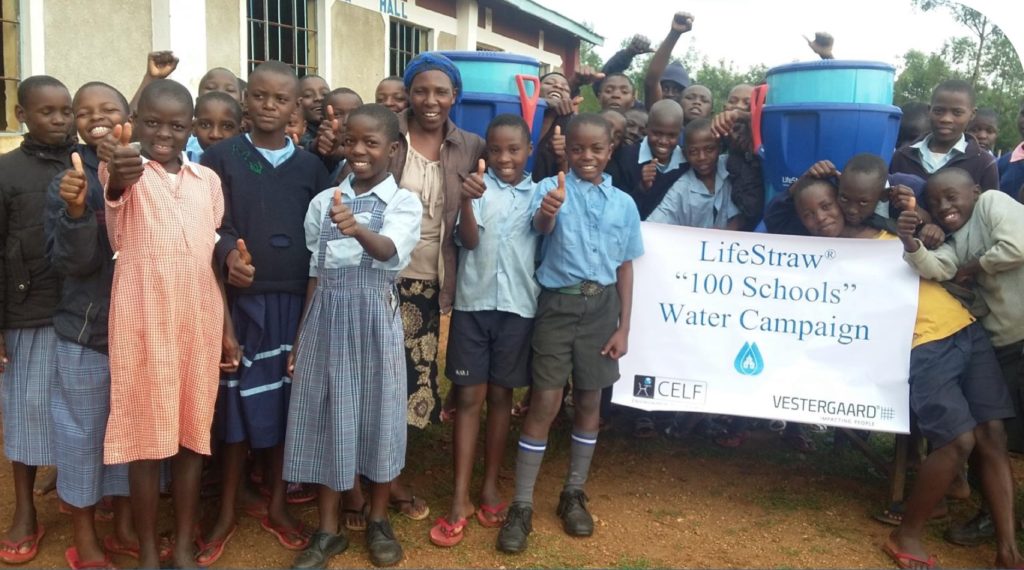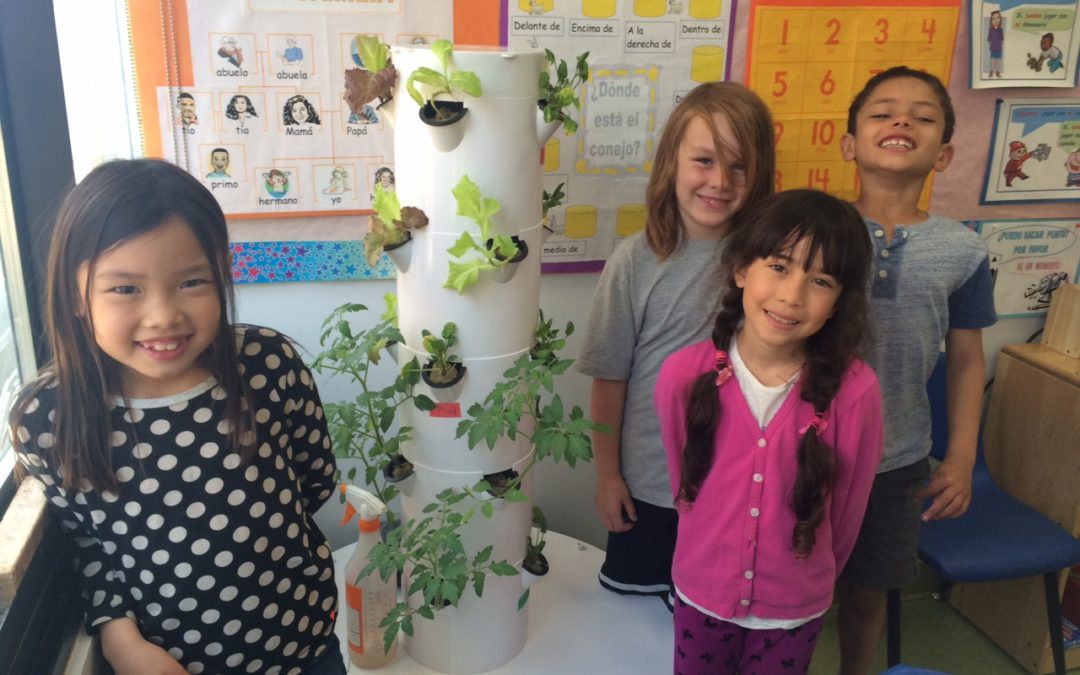By. Holly H. Moskow, Director of Communications and Development for Children’s Environmental Literacy Foundation
The Children’s Environmental Literacy Foundation (CELF) was founded in 2003 with the mission to deliver sustainability education to students in grades K-12, based on the belief that all children should understand the complex interconnections between economic, social, and environmental systems to develop skills, knowledge, values, and behaviors that contribute to a sustainable future. CELF focuses its efforts on training teachers to integrate sustainability concepts into existing curriculum, and works with all grade levels and subject areas, in both public and independent schools. To date, CELF has reached over 8,000 teachers and 800,000 students.
One of CELF’s largest program partnerships has been its Leadership Training in Sustainability Curriculum for the New York City Department of Education. Recognized by the Clinton Global Initiative as a Commitment to Action Project, CELF applied its turn-key model in working with thirty New York City Public Schools over a period of three years. The program is currently being piloted in the Los Angeles Unified School District and serves as a scalable, successful model that can be implemented by schools and districts in a broad range of settings.
The program begins with a Summer Institute, during which teacher teams take part in an intensive multi-day professional development program for sustainability education integration. During the Institute, participants gain:
- Training and curriculum development expertise demonstrating how Education for Sustainability (EfS) supports educational goals and enhances efforts in STEM (Science, Technology, Engineering, and Math) subjects.
- Assistance with curricula development that supports individual school and/or district goals, inspired by the principles of EfS and consistent with Common Core Learning Standards and Next Generation Science Standards.
- Strategies to connect EfS principles to each participant’s subject area and grade level, and to map concepts across the curriculum.
- Best practices in EfS student assessment based on the CELF student performance indicators rubric and the North American Association for Environmental Education Framework for Environmental Literacy.
Subsequent to the Summer Institute, teacher teams work with CELF project leaders to set goals and strategies to incorporate sustainability into their curriculum and communities. CELF project leaders follow up with site visits, providing support and guidance throughout the academic year. New schools are paired with Mentor Schools that have successfully progressed through the program. Using an EfS framework, students become active stakeholders in local environmental and social justice service-learning projects .
Outcomes of the program were assessed by an independent evaluator from the Harvard Graduate School of Education, indicating significant gains in the following areas:
- Participating teachers came away with increased understanding of EfS content knowledge and made significant gains in three essential EfS teaching areas: (1) use of community and place in lesson plans; (2) engaging in systems thinking; and (3) teaching about specific sustainability issues.
- The evaluation also demonstrated a measurable increase in teachers’ use of STEM activities and place-based learning to teach the Big Ideas of Sustainability.
Teachers unanimously reported increased student engagement in the learning process. “As we start to move into these sustainable practices, we see our students becoming more invested as they do hands-on gardening and hands-on learning, like counting oysters, but also they are mentally engaged and looking forward as they are trying to problem-solve for the future.”
— Amy Goods, MS 447 Math and Science Preparatory School, Brooklyn, NY
CELF continues to train New York City teachers by offering accredited professional development programs through the New York City Department of Education.

Photo | CELF
The CELF-Sustaining Sustainability Education Program
In 2006, the suburban Scarsdale (New York) School District took the groundbreaking step of initiating a district-wide program for sustainability education. Few public schools had such programs at the time. Working with CELF, the district formulated an action plan, determining that the District needed to focus on three broad areas — (1) its own ecological footprint; (2) a gap analysis to identify where sustainability content was already being addressed; and (3) opportunities for integration through staff development.
With support from CELF, the District became one of four nationwide to receive an EPA-sponsored sustainable leadership grant. The grant allowed them to put together a 5-year strategic plan for their sustainability education program.
CELF offered multiple on-site professional development workshops for teachers and administrators through the Scarsdale Teacher’s Institute. More than 75 teachers have gone through the training, significantly broadening the scope and number of people in the District committed to the program. By 2009, CELF’s teacher training program resulted in a cadre of turn-key trainers within the District.
The District’s other sustainability activities to date include:
- Participating in CELF’s Students for a Sustainable Future EXPO.
- Participating in the CELF School Eco-Footprinting Program.
- Establishing organic gardens at every school (the high school brings produce to a local food bank).
- Establishing green clubs in each of the seven schools, which are heavily involved in recycling and reducing their use of plastics.
- Adopting a Board of Education resolution committing to reduce the District’s carbon footprint by 10% below 1990 levels by 2020, a significant reduction for a community that has grown considerably since 1990.
- Adopting a planned energy control program that will be paid for through energy savings, including new thermostats and lighting, and will improve the tightness and insulation of each building’s envelope.
Many teachers have introduced sustainability concepts in their classroom, and formal curriculum change is happening over time. The teachers who are active in sustainability education are serving as models and inspiration for their colleagues in understanding how and where EfS fits across disciplines and grades.
Administrators were enthusiastic about CELF’s approach: “When we first started working on sustainability as a district, we partnered with CELF and developed several local summer institutes for teachers. I always saw CELF’s role as being part inspiration and part expertise, and I think that’s what they bring to a school district. If you have teachers who are interested, they need someone to cheer them on and get them excited about it. And then at certain moments they do need some expertise and training into what possibilities are in their curriculum, and also outside the classroom.”
— Duncan Wilson, Principal, Fox Meadow School, Scarsdale, NY
CELF’s Sustainable Schools Program has been implemented in a wide range of school settings including the Boston Latin School, Yonkers Public Schools, Greenpoint Brooklyn Schools, United Nations International School, and most recently, Warwick Valley Central Public Schools, among other public and independent schools.
Inspiring Future Leaders in Sustainability: STEM and Service
In 2012, CELF established a partnership with Vestergaard Frandsen, manufacturer of the LifeStraw® water filtration system, with the mutual objective of raising U.S. students’ and school communities’ awareness of the global freshwater issue. The fresh water issue has been a central theme for CELF’s high-school Student Ambassadors.
The partnership began with CELF’s and Vestergaard’s collaboration on a K-12 curriculum for schools and community groups to educate their students about the global freshwater crisis. The “Water Guide” materials encourage groups to take action on the issue by raising funds to purchase LifeStraws for communities in need and by doing educational outreach. In all cases, LifeStraw® is featured as a “service learning” opportunity for students and community groups. CELF’s partnership with Vestergaard has resulted in many positive outcomes:
- The Water Guide curriculum is distributed in both print and digital media on CELF’s website.
- CELF Student Ambassador trainings demonstrate the LifeStraw® technology and “Designs for the Other 90%” in dozens of schools.
- Student Ambassadors participate in national and regional conferences featuring LifeStraw® as a core component of educational programs and exhibits.
- CELF’s “100 Schools” social media fundraising campaign has garnered national attention and contributions from school groups, faith-based groups, scouting groups, and individuals.
To date, the “100 Schools” campaign has raised funds from 32 organizations and 97 individuals nationwide, which has funded filtration systems for 84 schools and provided fresh water for 4,200 students for four years. Participating schools are clearly making a difference in the lives of students like Perita Ndurusia of Pefa Primary School in Kenya: “Before LifeStraw® came, I had a lot of issues with typhoid, but now I am healthy. I used to miss a lot of school but now I am in school regularly and my grades have improved.”
CELF’s Upcoming Programs
Citizen Science & Social Justice in Your Community for educators in grades 5-12
July 12-14, 2016, 8:30am – 4pm, in Manhattan and Long Island City, New York
Connecting hard science and public policy, CELF is partnering with the Mt. Sinai Pediatric Environmental Health Specialty Unit and CUNY School of Law’s Center for Urban Environmental Reform to provide three powerhouse days of professional development for teachers in grades 5-12, with breakouts by grade level clusters. Connect with industry-leading science research professionals, learn to use New York City to make authentic place-based connections, and come away with citizen science opportunities for your students. P-credits will be available for NYC DoE teachers, pending approval.
2016 CELF Annual Summer Institute: Education for Sustainability for K-12 educators
July 18-20/21, 8:30am-3pm, Manhattanville College • 2900 Purchase St. • Purchase, NY 10577
CELF’s Annual Summer Institute in Education for Sustainability (EfS) is an intensive 4-day professional learning program that enables K-12 teachers to integrate the concepts of sustainability into their existing curricula. Through an interactive, constructivist approach, the Institute equips teachers with instructional practices that address the core concepts of EfS – the intersection and balance of social, economic, and ecological systems.
The Institute begins by building a learning community and a common vocabulary around sustainability and continues with hands-on activities, case studies, special guest presentations, and field-work. Lesson-planning time is built into the schedule so participants have tangible materials to bring back to their classrooms. Past participants are the best advocates for the Institute experience. As one high school Biology teacher put it, “I have never been so compelled to re-think my purpose as an educator.”
Learn more about these programs and about how you can bring CELF’s expertise to your school.
About Holly H. Moskow
Holly H. Moskow is the Director of Communications and Development for CELF. Holly spreads the word about CELF’s programs and supports the Executive Director on fundraising activities, working on development strategy for expansion and diversification of the organization’s funder base. Prior to joining CELF, Holly served as Executive Director and President of Sheldrake Environmental Center. Holly held positions of increasing responsibility in marketing and brand management at Fidelity Investments, American Express, and Colgate-Palmolive before entering the nonprofit world. She holds a BA in English and communications from the University of Pennsylvania, and an MBA in marketing and finance from the J.L. Kellogg Graduate School of Management at Northwestern University.
Link to pdf of Sustainability Fair Program in Google Drive Folder.
Link to pdf of Big Ideas in the Google Drive Folder.

